We’re Employee Owned and B Corp certified!
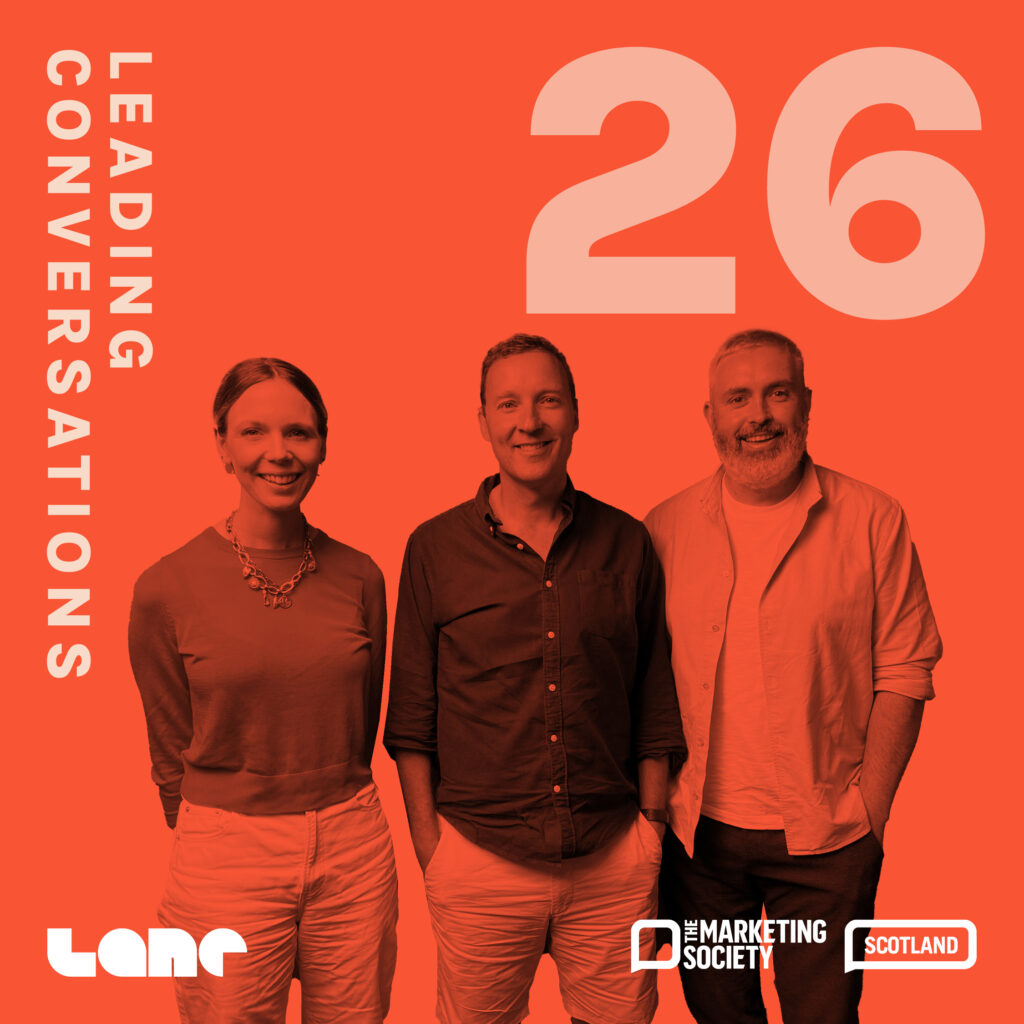
In this ‘special’ episode of Leading Conversations, Barry talks to Stuart Mackenzie and Hazel Alexander from C&C Group about all things Tennent’s.They cover a varied range of topics from the history of Hugh, the wit, warmth and humour behind the Tennent’s brand, the challenges and opportunities in attracting the next generation of consumers and their latest campaign: ‘Get to Germany’.
BARRY: Good morning, afternoon, or evening, wherever you’re tuning in. I’m Barry Fearn, and this is the Leading Conversations podcast, brought to your ears wherever you’re listening, in partnership with Lane and the Marketing Society Scotland. Thanks for joining us, if you’re a new listener, and welcome back if you’ve tuned in before.
As regular listeners will know, this podcast highlights the creativity, the passion, the resilience, and the success of some of our talented industry colleagues. And today, I’m joined by Hazel Alexander and Stuart Mackenzie from C&C Group. Thanks both for joining me on the Leading Conversations podcast.
STUART MACKENZIE: Hi Barry.
HAZEL ALEXANDER: Hi Barry, thanks for having us.
BARRY: Our episode today is a little different to the norm. We’re going to delve into the marketing, past, present, and future of one of Scotland’s most famous brands, Tennent’s. It’s a Tennent’s Special, if you like.
But to set the scene before we get into the depths of what has made Tennent’s the number one selling beer in Scotland, let’s take a trip back in time to get to know today’s guests a little better. Hazel, we recently met at a Marketing Society event held at the Dry Gate Brewery. And helpfully, you started me off on my research into your backstory.
So tell us a bit more, after graduating in Marketing at the University of Stirling, where did you land your first marketing role?
HAZEL: So I didn’t go straight from having studied marketing at uni, actually didn’t go straight into a marketing role. So I joined the commercial graduate scheme at Tesco on graduating. So I was a buyer there for a couple of years.
I worked in produce. So I actually bought flowers, which was a brilliant category to work on. I got to do quite a bit of travel with that as well.
And I always think back on that experience as something that really grounded, I think, my career, but also has played a huge advantage in my career today as a commercial marketer. So really understanding the process from sourcing ingredients and products all the way to reaching the end consumer. And as a buyer, you live and breathe by your P&L and your budget.
So it was a really, I think, steep learning curve, but I always look back on that as an amazing experience. I think through that as well, that role gave me an opportunity to further understand the consumer and actually what they were looking for, where were the opportunities from a category perspective. And I found that that was something that I was really passionate about.
So I actually moved to the inside arm of the business and worked with multiple manufacturers across Health & Beauty.
BARRY: And that was at Dunhamby, part of Tesco.
HAZEL: Yeah, part of the wider Tesco group. And that actually opened up an opportunity for me to move to a really similar company who were looking for people with that commercial background and expertise in shopper data and understanding within Australia. So I made the move in 2014 to Melbourne and I was with a company called Quantium there for a couple of years.
So again, utilising shopper data insight and analytics from the major retailers over there’s loyalty programme to help inform again, various manufacturers predominantly across packaged foods, to write their category promotional and pricing strategy as well. So worked really, really closely with the retailers over there. Again, got lots out of that role.
And as I think I look back over my career, I’ve had a real opportunity to kind of work across lots of different categories. And you’ll find it’s actually surprising sometimes how many synergies there are across completely different categories. And from there, I then moved over to to Mondelēz to work in a category role.
I think at that point in my career, I’d had exposure to doing both commercial and insight roles and wanted the opportunity to do something that really married both of those up. And that’s ultimately where I ended up in brand management and have been there ever since.
BARRY: And what was your favourite brand you worked on at Mondelēz and Oz?
HAZEL: So the Natural Confectionery Company. They’re the key players.
BARRY: The Jelly Snakes, right?
HAZEL: Yeah, the Jelly Snakes. They’re actually not too present in the supermarket aisle here, but they’re the number two player in Australia in candy. So as part of that, I got to work on some brilliant projects.
So I launched the category, Breakthrough Innovation of 25% less sugar candy there. So again, really had quite an innovation focus through that role. And I think having worked with a major blue chip manufacturer, brand building at the heart of the business itself, again, I think that’s set me in really good stead for the rest of my marketing career.
And also, I think through that role, just the power and weight of the category and insight resource as well. And being able to, I think, really dive into that passion of mine, which is the consumer, its strategy, its planning, but being able to have the resource to do that as well. So I’ll look back on that as a really great experience and something that’s probably been really fundamental to my career.
BARRY: And then what enticed you back to the UK from the beaches and the sunshine of Oz?
HAZEL: I think I moved to Australia, it was meant to be two years, and it ended up being seven and I came back with a passport. But yeah, I think very much my family is still here and it had never been a forever move. And after COVID, you know, I think everyone had the opportunity to reassess where they are.
On moving back to Scotland, I very much want to continue to work in brand marketing. And I think in Scotland, if you want to work for a big brand, there’s probably two key really obvious ones that you want to look at. And just coincidentally, there was a senior brand manager opportunity at Tennent’s that came up.
So yeah, it was just a perfect time and really I successfully got that role. So that was two and a half years ago that I joined Tennent’s and I’ve been here since.
BARRY: Very good. Stuart, your journey to C&C Group is a little less linear. Give us the whistle stop tour version of where it started to how it’s going, please.
STUART: Yeah, I mean, I think so a non-traditional route into marketing. When I was at school, I sort of had this decision, I think, between going to art school, always being creative, considering doing like a fine art course, also really good at English, but preferred the sort of creative writing. I had this discussion with my parents about like what my job was going to be when I came out the other side of it.
And ended up going to do journalism, which I loved. I left uni, worked as a freelancer for a while, did some work in music journalism, sports, so like passion points for me. But I think probably quickly realized that likely my career path wasn’t going to be in journalism.
I managed to get some work experience at PR agency called Burt Greener, which was amazing, suddenly opened my eyes to this world of what communications and PR and marketing could look like. Working for Irn-Bru, there was stuff with DF Concerts around Tea in the Park. Tennent was a client.
It’s super exciting to be able to come and tell stories, which is ultimately what drives part of me is communicating stories and engaging consumers. That could be my job. From there, a bit of a jump around, I moved into a couple of public sector roles.
I moved to Sports Scotland and then Events Scotland as part of Visit Scotland. In the run up to 2014, it was a really exciting chance to be part of teams working on Commonwealth Games, Ryder Cup, the MTV Awards. I was also doing communications for the Scottish Commonwealth Games team, so athlete side, athlete management.
But I felt like I had this commercial gap missing from the work that I’d seen in my early part of my career. So I had the opportunity to go and move into SSE to work on the sponsorship portfolio there. So looking after the Hydro, the sponsorship of Wembley Arena down in London, Women’s FA Cup, great to be part of the biggest women’s sports sponsorship at the time.
And really starting to join the dots between brand and commercial. And then really wanted to get back into drinks, to be honest. Again, passion points, I love being part of the drinks industry.
When I was at Burt Greener, Lee Beattie and Pam Scobey were two account directors at the agency. They obviously went on to set up Wires. Now John Doe Group, two people that have been a massive support and inspiration to me throughout my career, basically got the opportunity to go and join them at Wires.
I was like, this is too good an opportunity to pass up. C&C Group, ironically, one of the biggest clients I had, but also lots of whiskey, chance to do a little bit more sport, music again with DF, which is just exactly what I needed at the time. Really, really exciting challenge.
Brilliant agency. The work coming out of there to this day is still amongst the best in the country. After that, I hadn’t probably planned to do another agency role, to be honest.
I thought my slightly getting towards a linear path was going to be in-house, brand side and probably in drinks. But again, opportunity at the right place, right time, the chance to go and join the team at Frame and particularly to work on football. So UEFA as a client are not going to get opportunities to go and work on things like the Champions League, Europa League, Euros in Scotland very often.
It’s like that tends to be the sort of thing you need to travel or move abroad, do something like Hazel did, probably go and live in Switzerland for a while. Again, just felt like I was at a point where that just really, really interested me. I could add a lot of value, got a lot of experience in sport, tying up brands, got to do some work with UEFA and Disney, which was amazing.
But then the job that came into C&C Group is a job that was vacated by George Cowell, which I’m sure many of your listeners will know, a stalwart of the Tennent’s business. I think he started doing, we started in the business, I think I was probably still at school. So one of those things, if I don’t go for this opportunity now, when’s the next time it’s going to come up?
if someone’s going to come into this role and could easily be 20 years in the job. So I was like, this is my chance to get in.
BARRY: A real varied career so far, but certainly sounds like you do what you love.
STUART: Yeah, I’ve always been…
BARRY: Everybody aspires to you, right?
STUART: That’s the thing is I’ve always prioritized doing things that excite me and interest me. And I’ve been really lucky. You know, like I look back at some of the stuff I’ve done, I actually can’t quite believe it.
And yeah, I started off in that sort of like journalism into PR and communications. But I think for, you know, 10, 12 years now, I’ve considered myself more as a marketer. I’ve been in much more rounded teams.
You know, I’ve been leading teams across digital design, PR, quite a lot of work in creative media. And I think that’s sort of like the core skill sets there. But actually, I like I describe myself as a marketer.
BARRY: Thanks very much for those intros.
Now let’s take a look back about how it all began for Tennent’s. I’m sure some of our listeners will know a little about Hugh Tennent, but could you enlighten us all about how the brand actually began, please? Stuart?
STUART: Yeah. I mean, it’s a, you could probably spend a few hours chatting through the history of that.
BARRY: We’ll maybe do the whistle-stop version yeah.
STUART: I mean, yeah.
So where we are based to this day, Well Park Brewery in the East End of Glasgow. Brewing started there back in the 1500s. It’s like 1556, the first brewing happened on site.
And then, you know, it’s continued in various forms to this day. But in terms of like the Tennent’s brand, the brewery came into the Tennents family in the 1800s. And Hugh Tennent, the father of Tennent’s Lager, went on a trip to Europe, landed in Bavaria and came across this Pilsner style lager that he brought back to Glasgow to start the production of Tennent’s Lager, which is, I guess, is the brand and the product that everyone knows today.
You know, being brewed since 1885, it’s the same recipe. You know, brilliant ingredients, mostly Scottish sourcing. You know, hops is the only thing we sadly don’t have the climate for to produce here, but everything else is, you know, top class Scottish produce.
We get water from Loch Katrine and, you know, the rest is history in terms of the popularity of the brand. But for me, I think it symbolises something in marketing in Scotland, that, you know, it’s one of the biggest brands, but it’s also, it’s got so many examples of like great marketing from our sort of predecessors, right?
BARRY: Tell us a bit more about them. How has marketing specifically for Tennent’s evolved over the years then, over the, at least over the last few recent decades?
STUART: I think it’s always been innovative. You know, it’s always pushed boundaries. I think like creativity is always at the heart and it’s got a really, really clear, you know, brand position and brand identity.
Like everyone has a view on what Tennent’s stands for. I think it’s a testament to some of the work. There’s not many brands, I don’t think anyway, that have, you know, you might have a favourite ad that happens to be from a brand.
There are very few brands that you have a favourite ad of their ads. Like I’m assuming, don’t want to be presumptuous, but you probably have a favourite Tennent’s ad.
BARRY: I do actually. Ironically, it’s the history of you, which is going back probably 13, 14 years ago now.
STUART: Yeah, it’s like the Sam Hewan.
BARRY: Yeah, yeah. Yeah, who’s obviously come on to quite a lot of fame in recent years. But I remember when he was, I don’t know, 21 or whatever age he was and doing those commercials, it was New Haven was the agency at the time that was behind those.
So yeah, that’s probably my sort of favourite, not going back too far.
STUART: Have you got one, Hazel? I was just thinking about this last night.
HAZEL: I think there’s, you look back on the history, I think there’s quite, they’re quite varied, to be honest, in terms of the adverts. And, you know, there’s some relics there that, you know, I’ll speak about like the Lager Lovelies, for example, you know, it’s a relic, it’s a moment in time and wouldn’t be something that we would do to date. Whereas other ones, you know, the Caledonia advert, that’s really still got the, it’s got the passion in it.
And anyone who has lived, not even just overseas, but you know, not in Scotland, you can really, really empathise with that character. And I think it celebrates very much that euphoria or the triumphant and reaching that great point of Tennent’s with your friends. So really the sentiment of that, I think, is something that has stayed true and very much continued through to the modern day as well.
Probably if you look back even more, the kind of last 10 years per se, some of the adverts have probably lent further into probably the wit and humour side of the brand. And we’ve always carried that as something that is really true to Tennent’s, but potentially at times, we’ve not focused on the product as much within that. We’ve got a brilliant lager.
We recently just won a gold medal at the World Beer and Cider Awards. So that’s something that when we look at the advertising we’ve got today, we’ve continued with very much that that wit and warmth that people know Tennent’s for, but also continue to really celebrate our products and actually how that’s enjoyed amongst consumers as well.
BARRY: That’s interesting. Thinking about some of those sort of inconsistencies over the years, why do you think, and I appreciate you weren’t necessarily in the role at the time, why do you think there has been some of those inconsistencies with the brand?
HAZEL: I think there’s been, you know, you’ll often find that you’ll have, you know, as brand marketers, we’re custodians for, you know, we’re not here forever. And often you’ll have brand teams that will take, yeah, take the brand or the decisions in a different direction. But sometimes that’s, you know, a reality of what’s going on in the category at the moment.
And if we reflect back over, you know, not just at the time that we’ve been in role, but even sort of slightly prior to that, you know, the beer category has changed. A lot more influence now from world laggers. So people actually expect much more from their pint.
And also people are more value conscious just now as well. So again, that’s why it’s really important that we focus on celebrating and communicating what a great pint Tennent’s actually is, rather than just looking at the brand as something that’s, you know, humorous or going to make people laugh. So I’d say that’s a big influence as well for us.
It’s been really aware of what’s going on, not just with our immediate sort of brands that we’d consider as competitors, but actually in the much wider category of landscape as well.
BARRY: Taking that step back, on a similar vein, you know, we talk about some inconsistencies. Maybe this was both a challenge and an opportunity. And Stuart, you touched on this in terms of your third party experience as well.
But could you tell us a little bit about the 20 year association with T in the Park and maybe some of the pros and the cons of that over time?
HAZEL: Yeah, so T in the Park, Stuart and I can probably both agree that, you know, amazing memories from going to that festival ourselves. What was that probably about? Yeah, coming up like sort of a long time ago now.
But certainly for me, that was probably the first real opportunity that I had to really connect with the brand. And, you know, I’ve still got really clear standouts in my head from, you know, when you’re on site at Bladdle, that the brand and even on like the main stage, just that red T was really shining and it’s full glory. So from a recruitment point of view, it definitely engaged, you know, with that younger audience and brought them into the brand.
And so there’s a real, I think, positive there. And, you know, that remains a key consideration for us just now is actually how we engage with that younger generation when there isn’t that core festival or core summer moment there. It’s almost a rite of passage at the time.
STUART: I think it’s like part of, like for me, the Tennent’s brand’s always given you something. And it’s kind of, there’s other bits in, it’s like just really unique in lots of ways. It’s something that people like, I mean, I think maybe back a lot, so like 10, 15 years ago within the industry, we’re talking a lot about like the concept of like brand love.
And generally that doesn’t exist. I think we probably got to the point where we could prove that that doesn’t really exist. I think Tennent’s is one of those brands where I see so many examples where you actually do start to lean into that.
Like people genuinely care, like normal people care about this brand.
BARRY: It’s one of the iconic Scottish brands, regardless of the category.
STUART: It stands on its own. And I certainly like growing up, it was that thing where T in the Park, it felt like something that was being given to Scotland. And the team at DF did an amazing job on programming, but the festival, like multi award winning, but it felt like you were getting something.
And also like for Tennents through football, you had those sort of two, for me as a kid, or like a kid, but like growing up, like turning 18, starting to be able to go to festivals, seeing more international football. It felt like just such a massive part of what it was to be Scottish, hitting your early twenties, just like this massive part of your life. And even now, the football associations continued, the partnership with the Scottish FA has changed a couple of times, but the first association between Tennent’s and the national team was in 1974 for the World Cup.
We were about to go to Euros. The last time we qualified properly for something like this was 98. And I remember reasonably distinctly running home from school.
I think it must have been an early afternoon kickoff. And we got out of school early because Scotland were playing Brazil in the opening game. And I think to be back with Tennent’s supporting a Scotland team coming into Euros is just a really exciting moment for the brand of the country, but it also just sort of cements that continuation really of the role that the brand plays beyond a pint on a bar or a can on a fridge.
It’s much more than that.
BARRY: I’m very impressed when I heard that stat recently at the Marketing Society event that Tennent’s has now been working with Scottish Football for 50 years. I mean, that’s some milestone. Could you tell us a bit about how that relationship has evolved, please, Hazel?
HAZEL: I’ll just actually start by saying that relationship, if we bring it back to the brand purpose of Tennent’s, it’s uniting people through celebrating the best of times and the best of Scotland and football being one of those best of times. So it is a real opportunity for us to bring people together, to celebrate or mark every different moment that eventuates through anyone in Scotland following our national football team. I think the relationship has evolved.
We have actually considered the last couple of years, and we’ve always had that partnership, where we’ve featured our lockups, the T stands really proudly alongside the Scottish Football Association lockup as well. But there’s also been a really focused effort around things like that match day experience and what Stuart spoke about there around giving something to fans as well. Our best seat in the house experience, for example, it really is the best seat in the house.
We’ve got seats at Hampden Stadium, and it’s a competition, for example, that we run throughout most home games, whether that be friendlies or key qualification games for anyone, tenants, consumers to enter and win the chance to really have that once in a lifetime opportunity to sit pitch side. So there’s a real piece around elevating the fan experience, but also working really closely with our partners there to understand how we can continue to elevate and move that partnership forward as well.
BARRY: Talking then about those sort of money can’t buy type experiences, I know there’s a big campaign currently running with the euros around the corner. Tell us a bit more about Get to Germany.
HAZEL: Yes, so Get to Germany, gosh, has been in planning for a number of months now. But really, as we sort of took a step back and had, I think, as a broader cross-functional team around how we best wanted to, I think, mark the euros and actually that qualification moment in a uniquely Tennent’s way. So Get to Germany was a competition that we opened at the start of the year and invited Scotland’s biggest football fans to apply for it.
And us as Tennents would really facilitate the ultimate football race from Glasgow, from our brewery and Wellpark, all the way to Munich and Germany with multiple stops along the way. And the multiple stops being those locations that were really kind of iconic Scotland football moments as well. That will be available for everyone to watch from the end of May, so from the 30th of May on YouTube, a sort of five, ten minute episodes.
So again, part of that consideration was, it’s really digital first within its execution as well, and has really enabled us to tap into, I think the real optimism and pride ultimately as well, that’s very much following the Scotland football team at the moment after a really great run to actually get to qualify. So we’ve seen the first cuts already, really exciting, great episodes.
BARRY: It looks a bit race against the world, you know.
HAZEL: Yeah, it’s definitely got a race element to it, and there’s multiple challenges along the way. So yeah, it’s been a brilliant project to work on with a studio or something. So they’ve been the agency that we’ve really partnered with on it.
BARRY: Good. I’m looking forward to that.
I’d like to delve a little more into some of the challenges that Tennent’s and of course other brands in the drinks industry currently face. So drinking in moderation is obviously multifaceted. There’s significantly different trends between demographics and of course the rise of low and no alcohol variants as well.
So I just wonder how you guys are embracing this and how does this impact on the brand’s growth plans, Stuart?
STUART: Yeah, I mean, I think these are our challenges or these are the things that we’re discussing. I think you look back over the years, there’s been multiple things across category and just in general, the way consumer trends and the way that things evolve. I mean, for us, it’s most simple.
It’s like being there to provide a product that meets a consumer need. It’s making sure that we are, if people are looking to moderate completely, that you’ve got a zero offering, that it’s people who are looking to maybe take in fewer calories and a slightly lower ABV, lower calorie, Tennent’s light, NPD that launched just before COVID. I think that’s quite a simplistic view, but that’s it really.
You’re not looking to create something that’s not there, but it’s about giving people an experience or a brand experience or a product to meet a need or a consumption moment. Those SKU’s or those parts of the brand have their own plans and their own strategies, and they will continue to evolve. But from a central brand point of view, we talk about Tennent’s Lager being the core hero product within the portfolio.
And just understanding what role they all play is something that we’ll continue to do. But I don’t think it necessarily impacts, you know, you’re talking about growth. It’s quite an organic thing.
BARRY: Yeah, it’s slightly different. I don’t want to make this too political, but what about the ongoing challenge of legislation from a marketing perspective?
STUART: I mean, it’s complicated. There’s lots of things going on that we as marketers need to understand and be cognisant of both in planning, but also just in the way that we deliver as a business. It goes way beyond marketing.
There’s some real practical elements, things like the deposit return scheme had some real tangible things that we had to consider around labelling, around production. When you’ve got a brand like Tennent’s that is available in almost every SKU that you could imagine, particularly when it comes to the off-trade, pack formats, sizes, that’s a lot of consideration, a lot of work to make sure that we’re ready for when that’s implemented. But I think Tennent’s as a brand, and this goes way back into the history, the business has always been part of conversation and I think we take our, particularly from a responsibility point of view, we take our responsibilities very seriously.
And we want to be part of whatever the world looks like in the future and make sure that we’ve made the right contributions towards that. We always engage, we’re always proactive, we come at things positively. And that’s inherent in the business.
And I think as us, as people, it’s part of what we do.
BARRY: I think positivity is a key word in terms of any time I’ve spoken to yourselves or other people from the brand. It’s definitely something that I would have on that word cloud around Tennent’s is positivity. It does feel like a very positive brand.
HAZEL: think we’ve spoke about this internally. There are challenges from that perspective on the horizon at the moment. But 10 years ago, there had been different challenges out there within the macroenvironment.
So the fact that we are navigating these waters at the moment, people who were in our shoes 10 years ago would have been in a different sea, but those challenges are always there. And given that Tennent’s is a really enduring brand, it’s an opportunity for us to continue to double down on our messaging, on our purpose, and what we really stand for as well. So that’s definitely been a key factor in our decision making.
We’ve been looking at our plans for certainly this year and the next couple as well.
BARRY: Hazel, you shared some stats at that impressive presentation about the health of the Tennent’s brand being at an all-time high. So what’s the key insights behind that impressive statistic in itself?
HAZEL: Yes, so our brand health is at an all-time high. So we track brand health on YouGov. So that’s been really, really pleasing to see.
And that brand health has been in growth from early autumn last year. I think a big part of that has been really consistent advertising or a real focus on communicating that brand purpose, but also that guiding principle around being really clear on that clarified brand position, which is centered all around Based in Scotland. So I think consistency definitely plays a key part within it there.
And that’s not just what we’re doing above the line, but goes for every sort of consumer, every consumer touch point. So I’ll also just note that our brand visual identity, that evolved last year as well. So there’s been a real focused effort to continue to celebrate the brand’s heritage, but really do that in a more sort of modern and fun way, whether it be that new brand visual identity or the OFT advert that was launched last summer.
When those components have gone into testing, those are things that it’s researched really well on, which was a key objective of ours. So I think with that consistency and effort, it’s gone a long way to really drive those brand health scores.
BARRY: Certainly very impressive. I feel like we’ve now covered the then and the now, but really interested to get your take on the next. So let’s gaze a little into the future.
You’ve specified some of the clear challenges and opportunities ahead, but I’m really keen to understand how you go about future proofing the legacy of Tennent’s. So Stuart, what’s happening at the moment in terms of future proofing, in terms of looking ahead?
STUART: Yeah, I mean, I think at the core of that, there’s the really clear responsibility, I think, that everyone feels for, as Hazel puts it, being the current custodians of a brand that’s endured for as long as it has. The work that’s just been done around, and I’m talking about, I guess, short to medium term, the work that’s just been done on brand positioning, the work we did with John Doe last year has really given us the right platform. I think we’re seeing the early fruits of that, and you can see the brand health as a good initial indicator.
But the challenge for us now is to make sure that actually we need to go and validate the thinking that’s gone into that brand positioning. It’s been designed to last for, whether it’s five, ten years, we need to go and continue to innovate creatively against that. We need to make sure that we’re building campaigns from that platform that continues to drive that consistency.
You know, sport is going to continue to be a really key pillar. We’ve spoken about football, but rugby is the other core element to that. Just now, a partner of the Scottish rugby team just renewed that partnership for another five years.
They’ve got equal rights across men’s and women’s game. So there’s bags of potential there from a sporting point of view, key pillar of Scottish society. It’s going to be something that we want to be part of.
But I think the bit that I don’t have the answer to the question is, what is next? And I think it is about, where do we look to innovate? Small things, if you go back to 1974 and the first activation of that partnership with the Scottish FA, at that moment in time, it was the team photo.
That was the thing that you branded. It was where you showed up. And it’s gone through all sorts of iterations.
We had beer mats into, I guess, more of a content-led, fan-led, to where we are now, almost like being one of the fans. And we’ve got that sort of credibility and association. I think we’ve got the authority to talk as a fan, because we’ve been there, we’ve done it.
Obviously, we’re in good times or better times, but we’ve also been there when it’s not been great. And the kind of content, whether it’s experience-led, you know, in the stadium or actually just how we show up through things like Get to Germany, so like the world of social, it’s like a different way of communicating partnerships. I think for me, it’s like, well, what’s next?
And, you know, we’re not going to spend hours talking about things like AI, but like there are so many things that we need to, I guess, just make sure that we get it right and execute properly.
HAZEL: The other piece for us all to collectively consider is, you know, just recruiting that future generation of Tennent’s drinkers. So especially that, you know, 18 to 30 age group, we’re all very aware of. It’s not even a trend, but, you know, it’s the preference.
It’s really moderating the amount of alcohol these consumers consume. And I think you’ve got that factor there, but on the other side, you know, and it was the same even when I worked in Confectionery and no other drink brands are facing the same challenge, but these consumers are also much more discerning and are much more less likely to be brand loyal versus, you know, the generations that have come before them. So really to both engage with them in an effective way, but also through a product that resonates to them as a key challenge and something we’re really getting under the hood of at the moment, because that will also inform our future innovation pipeline and ultimately our communications efforts as well.
So that age group do represent a big challenge, but at the same time, it’s an opportunity for us. And it’s a key question within our planning at the moment as well.
BARRY: Yeah, that will make sense. So we’ve talked a bit about the future of the brand, but what about sort of internally behind the scenes? You know, I know there’s been a large investment in sustainability, for example.
Could you tell us a bit more about that and what that actually means behind the scenes?
STUART: Yeah, I mean, I think that’s really around corporate responsibility and doing the right thing. This is over the past, say, 10 years or so, the business has invested a lot of money, particularly on site at Well Park. It’s like quite big, tangible investments in things like carbon capture.
We’ve got anaerobic digestion, you know, investment in the packaging plan.
BARRY: Sorry, Stuart, anaerobic digestion. I’m putting you on the spot here.
STUART: It’s a very… We’ll take a long time to explain this properly. But yeah, I guess the things that go into the process of making the beer more sustainable, how we use byproducts to create animal feed and even future-proofing things like that.
Right now, that’s a real need. But if consumer trends continue and we maybe eat less meat in the future, actually, what are the other uses for some of those byproducts as conversation that’s going on at the moment? There’s some work happening with some academics around how some of that waste or byproduct could be used better in the future.
But for… I think my observation on it would be it’s the right thing to do and the business is committed to doing it. But again, it’s like one of these things that’s sort of inherent in the brand.
You go back to the days of Hugh Tennent, he was investing money in what’s effectively social housing in Glasgow. There’s always been a real… And this is like community level, but like a real community feel about the business and work that we’ve done with smaller groups.
At the moment, we have a group-wide partnership with the Big Issue Group, and that’s C&C Group level. They’re doing some amazing work. I mean, you don’t need to tell people about Big Issue.
You know all the amazing things they do. And that’s part of doing the right thing. And that will continue.
Lots of work ongoing about how we hit our sustainability targets and objectives over the next few decades. And that’s not a unique challenge to us, and it’s not something that we’re uniquely doing, but we see what our responsibilities are and we’ll continue to invest. We also know that it’s important to me as a consumer
I want to know that the brands that I’m buying, regardless of the category, are doing the right thing. It’s difficult. I think working inside a brand and inside a business, you sort of see how hard some of these things are, but actually it’s important, I think, to demonstrate the steps that are taken.
And we know that from our own consumer research that that’s what people are looking for from Tennent’s. And I think ultimately it comes back to that point about responsibility. You’re one of Scotland’s biggest businesses, one of Scotland’s biggest brands.
If we’re not, you know, I’m not talking about leading by example, but it’s like if we’re not doing something, and for me it’s not about doing something and sharing about it, which is why we don’t, you know, we talk about it a bit, but it’s not like we’re not slapping it everywhere. We’ll talk about it in the right place at the right time in the right way, but we have a responsibility as a business to do those things.
BARRY: So what’s next for revenue growth? Is it doubling down on position in Scotland, you know, as the leading beer? Or is it going somewhere else?
Is it further growth in the rest of the UK or other parts of Europe?
HAZEL: Yeah, definitely continuing with, and we’ve spoke there about, you know, future proofing the brand for future generations. So it is really continuing to, I think, not just nurture where we are at the moment, but it is really seeking out those, you know, further, I think, growth opportunities that are present or potentially untapped at the moment. We do have an international part of our business as well.
So, you know, Tennent’s is available in many countries. It’s not just Scotland data. So it’s continuing to work with, you know, that team to understand where there are further opportunities that may not just be on home soil as well.
So I think there’s a piece to do on both grounds. But as I said, it’s really about us understanding, I think, and being fully aware and planned for that consumer opportunity for the next generation that’s going to enable us to really maintain our position in Scotland.
BARRY: Good stuff. And I noticed recently that Cara Chambers has joined the Tennent’s gang as well, the C&C gang as well as CMO. I think she’s probably only had a couple of weeks to get her feet under the desk.
But yeah, shout out to Cara as a previous guest on the show. I’m sure she’ll help the brand continue in its growth journey.
STUART: Yeah, absolutely. I think for us having someone like Cara joining the businesses, it’s always going to be exciting. You want people coming in that have got lots of experience, a real skill set to guide.
And we’re still learning as marketers, a lot of us in the team. Having someone to come in and guide us through the next period is really exciting. And also from a business point of view, it’s the first CMO appointment for the group.
So for me, it’s like a real mark of intent around where we see the role of marketing within the business and actually how marketing can be one of the core drivers for commercial success in the future.
BARRY: To summarize then, how would you describe a few top tips then for what has driven the success in recent years and hopefully the continued success in years to come of the Tennent’s brand?
HAZEL: That’s a good question. There’s definitely a piece around consistency and all execution. So we’ve still got roads to go or mileage to go on that to make sure that every consumer touch point is very clearly communicating the same message.
So I think there is a big part within consistency there, but it’s also been not afraid to challenge what’s been there before and take learnings from that too. So whether that be previous advertising campaigns or there’s multiple brands within our wider business portfolio. So it’s continuing to work with colleagues to learn from there as well.
And when things maybe haven’t worked, what’s the learning from that that we can potentially leapfrog over as well? You know, Tennent’s awareness in Scotland is not our challenge, but it continues to be, you know, how can we get that next person to pick Tennent’s at the point of purchase? So it’s been really clear on, I think, our objectives as part of planning as well
And being ruthless to things, you know, everyone’s got an opinion on Tennent’s. It’s rare that you get a day where you don’t get, whether it be someone from the business or someone external reaching out either with an idea or wanting to partner with you and somebody. But yeah, always that challenge around, in the long run, is actually going to deliver against our strategy or does it really clearly align to our brand purpose as well.
So I think being ruthless when we’ve got decisions to make has been really key.
BARRY: Stuart, anything to add on the top tips?
STUART Yeah, I mean, I think there’s like two parts. One, I suppose just to follow on from what Hazel was saying, I think there’s just like real fundamentals, like making sure that you’ve got a really clear articulation of like the brand purpose, the brand strategy, that everyone’s bought into that. You know, the danger with, I think, particularly like a brand, as Hazel says, like everyone’s got an opinion.
See if you don’t have that written down, and you can’t get everyone around a shared purpose. It actually like fuels those opinions, and actually that’s where you get into. I think you can get muddled, and this is where you start, like you end up getting a bit of inconsistency.
I think the big bit for me is around, you know, creating the environment that fuels creativity. It’s been so key to the Tennent’s brand, and the way that it’s been executed, and sort of like the pillars of the brand, and what it stands for, and the role it plays has changed, but it’s been consistent to a point. But that sort of idea of creativity, and we’re in a very different world now than we were 10, 15, 20 years ago from a marketing perspective in terms of what we can do, or what we should do.
But you still need to be able to be creative. And I think it’s like the sort of decisions that we took around doing something like Get to Germany versus, let’s just make another football ad. And time will tell whether that was the right decision, but it’s the right decision to make based on where the brand’s at, and the kind of work that we want to do.
BARRY: OK, so I’m going to attempt to summarize those top five tips from the two of you. I’ve got creating an environment that fuels creativity, brand consistency, cross-learning from within brands within the group, being really clear on brand purpose and objectives, and ruthlessness. I really like that.
STUART: Yeah, ruthlessness, that’s it. Don’t be afraid to say no.
BARRY: As is customary in the podcast, we draw to a close with an infamous fancy dinner question, but this time appropriate to the subject matter. We’re just going for pints. So I’d like to know who’s joining us and where we’re going, actually.
So your guests could be people that you know who you’d like to reconnect with, or even people that you don’t know, but have inspired you some way so far in your career. So who’s coming out for pints and where are we going? Hazel?
HAZEL: It’s a great question. I had to think about this. And someone who’s always been an icon to me is Dolly Parton.
And I think just someone who has really endured, not just time, but still has that connection with, you know, she spans so many different generations. And someone who’s always been really true to who they are and their character. And very unapologetic with that, and I think is an absolute pro at navigating the media and her fan base as well.
So I think we could all probably take a lot of learnings from her. Yeah, I think she’s a pure icon and a class act.
BARRY: We’ll have to go out just after five o’clock now, obviously, because she’ll be working.
HAZEL: Oh, that’s horrendous.
STUART: That sound effect afterwards.
HAZEL: Yeah.
HAZEL: I can imagine her actually in a really kind of like classic setting. Do you know what? I’m going to say we’ve got a secret bar at the Tennent’s factory site.
So I’m going to take her there.
BARRY: Like a hidden door.?
HAZEL: Yeah, it’s a hidden door, so it’s not accessible by the public. Some people have maybe been there as part of an event, or if you’ve worked at the business before as well. But it’s a very, very classic set up.
I can imagine somebody like that working quite well.
STUART: Timeless.
BARRY: Sounds good.
HAXEL: Timeless, yeah.
STUART: Yeah, I thought lots of people would be great to chat marketing with, but I think someone, for me, like hearing stories, I think someone like Rick Rubin would be amazing to sit down with. I think just one, his experience and what he’s done, and everyone that he’s worked with, I think picking his brains on some of that. But actually just, I really buy into, just what I was just saying there around, like creating the right environment for creativity.
He’s got such like a unique perspective. You sort of like look at the way he came into the industry, look at the way he works. Like on paper, none of it should work, but it does.
I just, yeah, I love the way he thinks, the way he talks. I think he’d just be a fascinating person to sit down with over a beer. I’m a creature of habit, so there’s a pub, I live in Lynlithgow, there’s a pub called Platform 3, which is a small little pub down from the train station.
They’ve got the train times on the board for the two platforms up at the station, but it’s a classic Scottish pub, small, it’s got a great atmosphere, it’s got a great selection of drinks by the bar, it’s obviously got Tennent’s on tap, but yeah, just like a really nice place to go and sit down with someone and have a blether.
BARRY: Sounds good, let’s get them together. Thanks to both for coming on the podcast and sharing your Tennent’s brand stories and insights. I hope everyone’s enjoyed our conversation today.
Thanks very much.
STUART: Yeah, thanks very much.
HAZEL: Thanks so much for having us.
BARRY: Thanks for joining me, Barry Fearn, on the Leading Conversations podcast. I’ve been speaking to Hazel Alexander and Stuart Mackenzie from C&C Group. As regular listeners know, I’m always keen to hear more from you, so please drop me a line at barry@lanemedia.co.uk if you’d like to say hello and tell me what you like or dislike about the podcast and any topics our listeners would like to hear about for future episodes.
If you’ve enjoyed this episode of the pod, it’s easy to follow for more episodes on Spotify or Apple or anywhere else you tune in to podcasts. Just search for Leading Conversations and follow for immediate access to future episodes and our growing back catalogue.
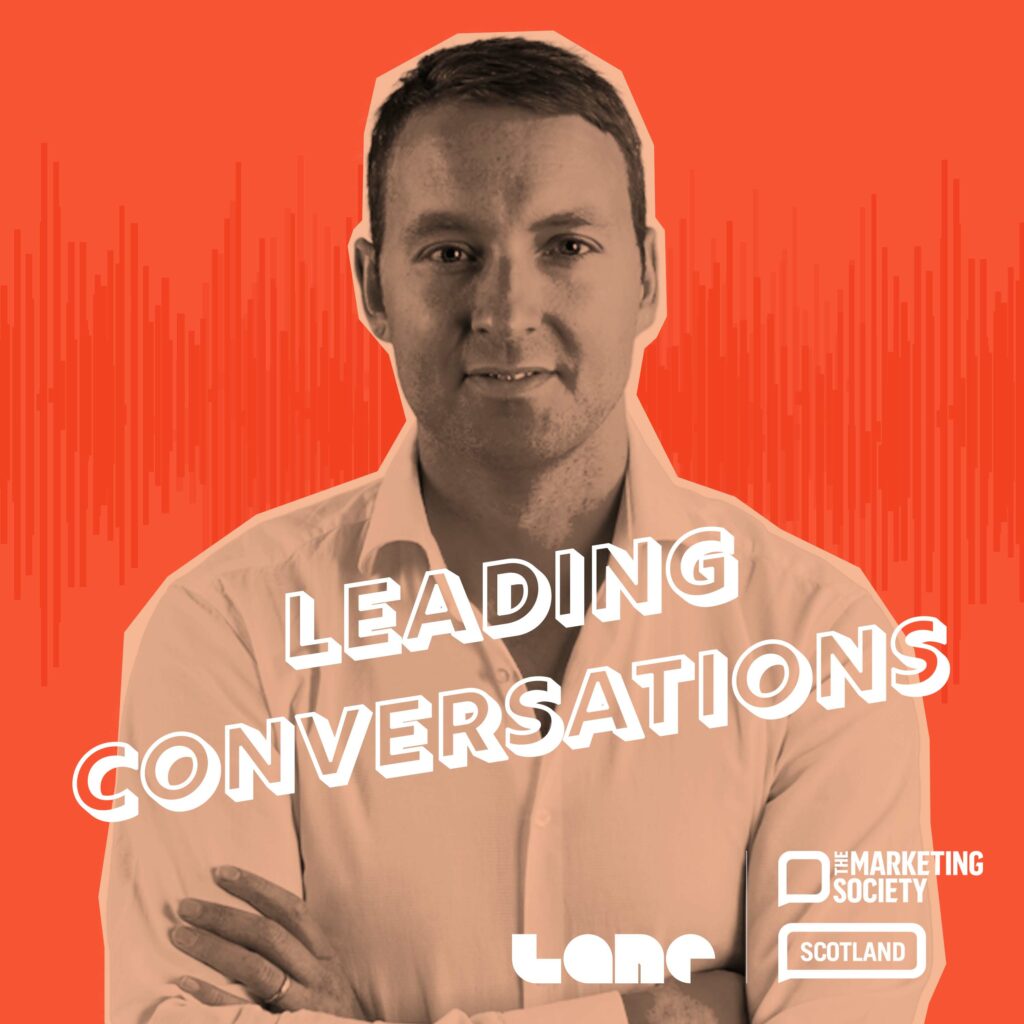
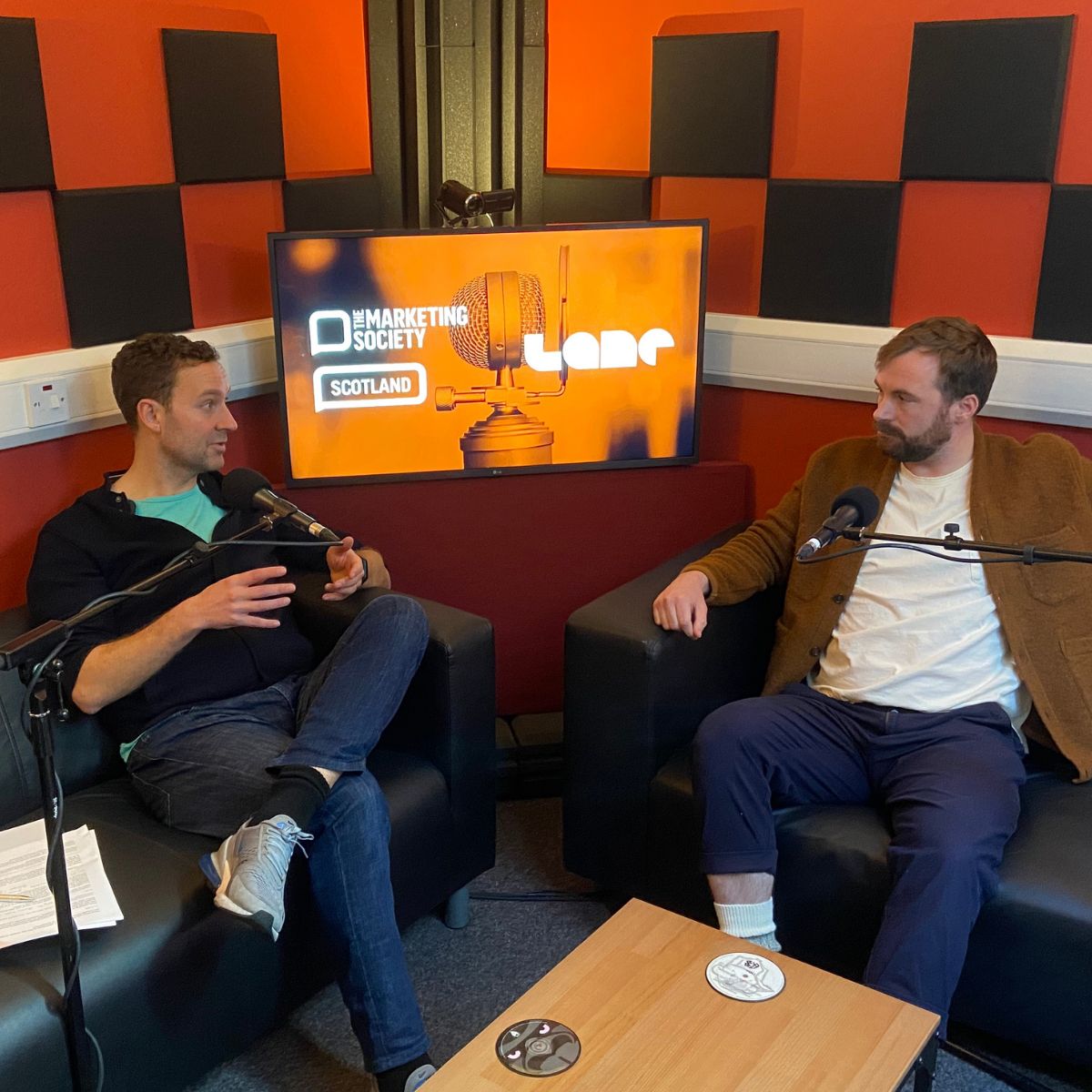
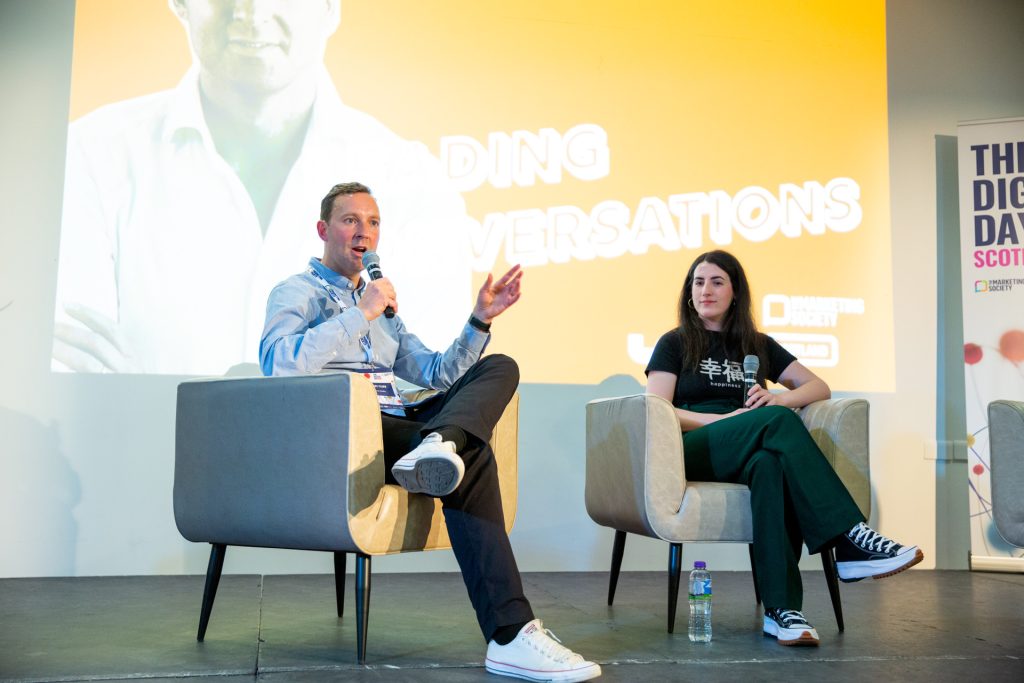
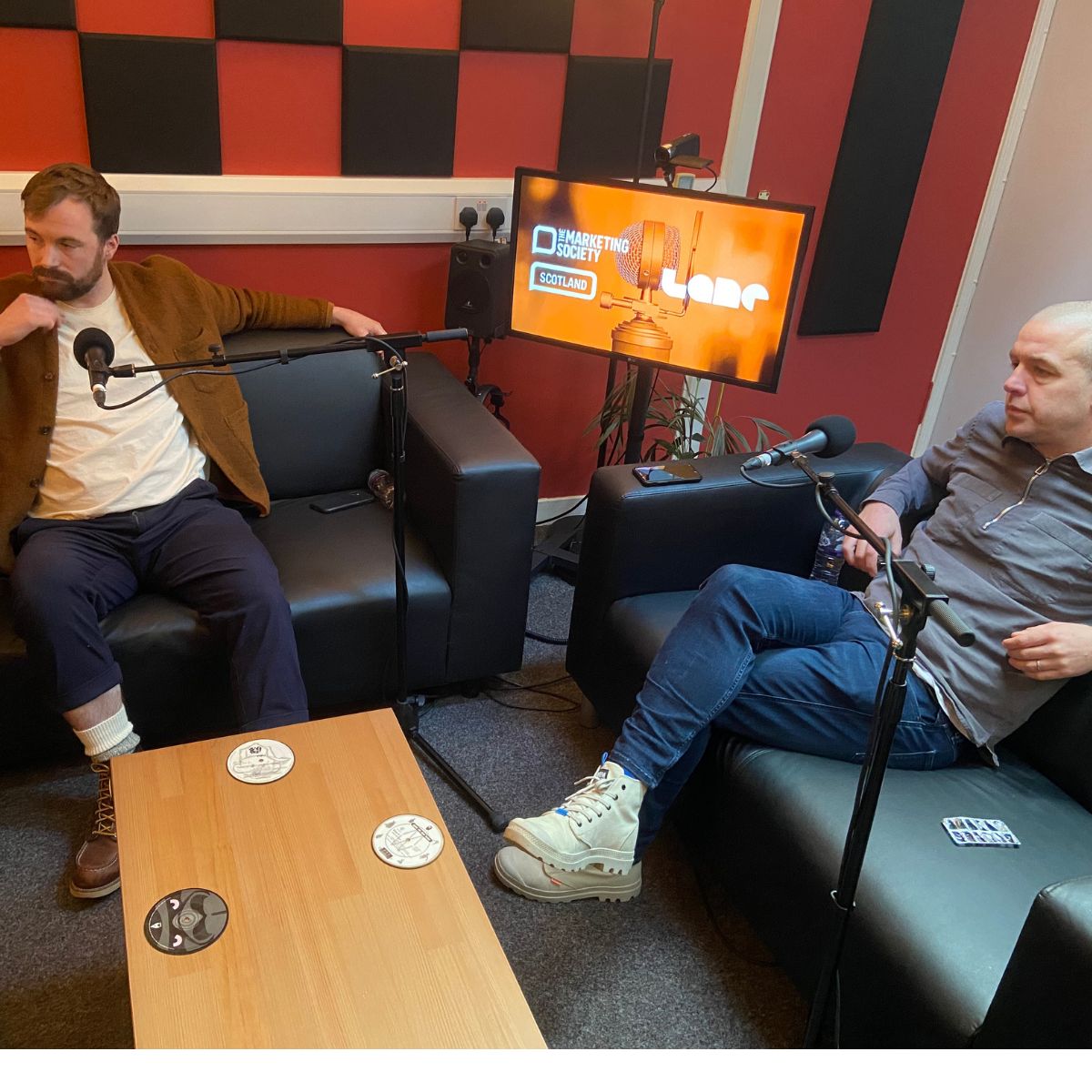
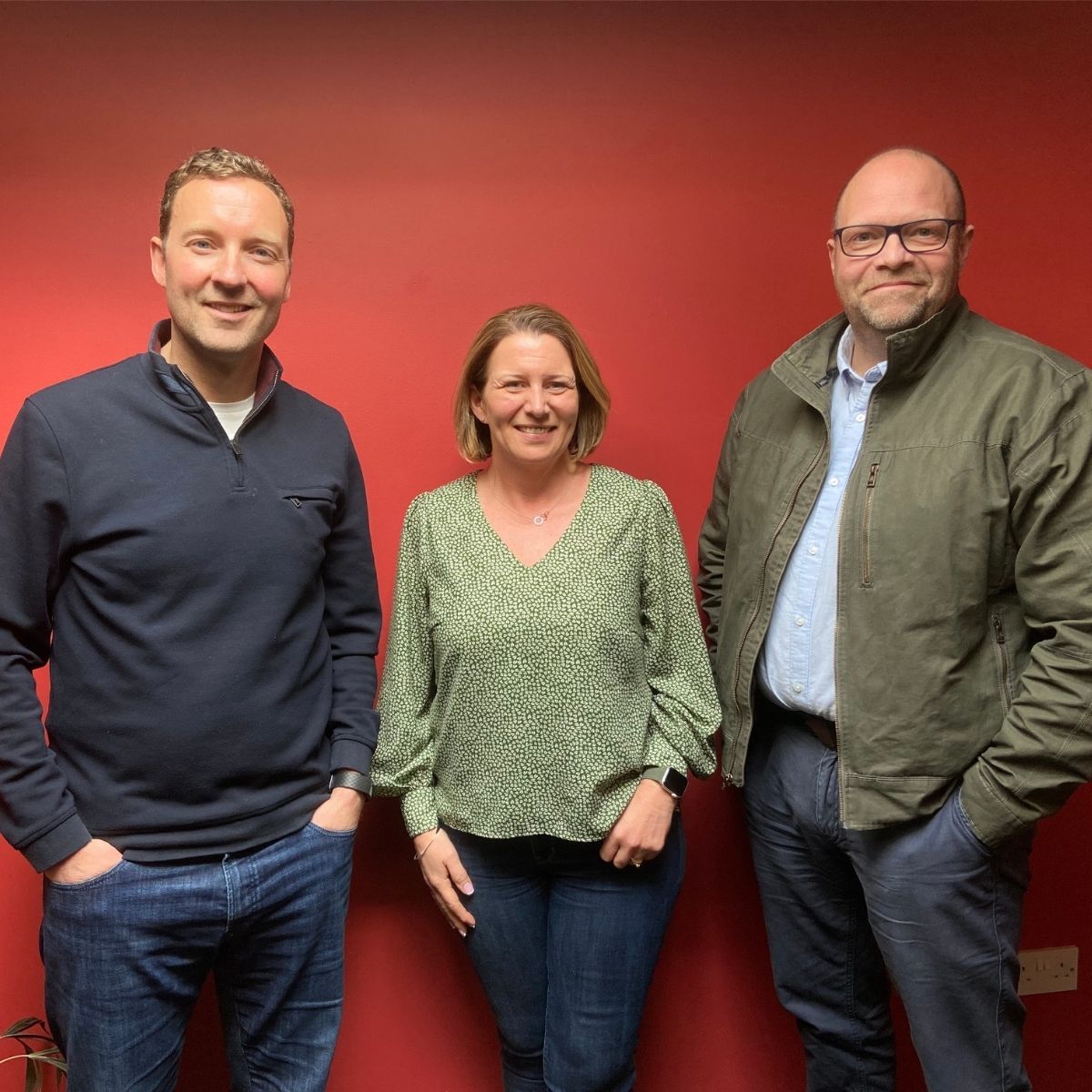
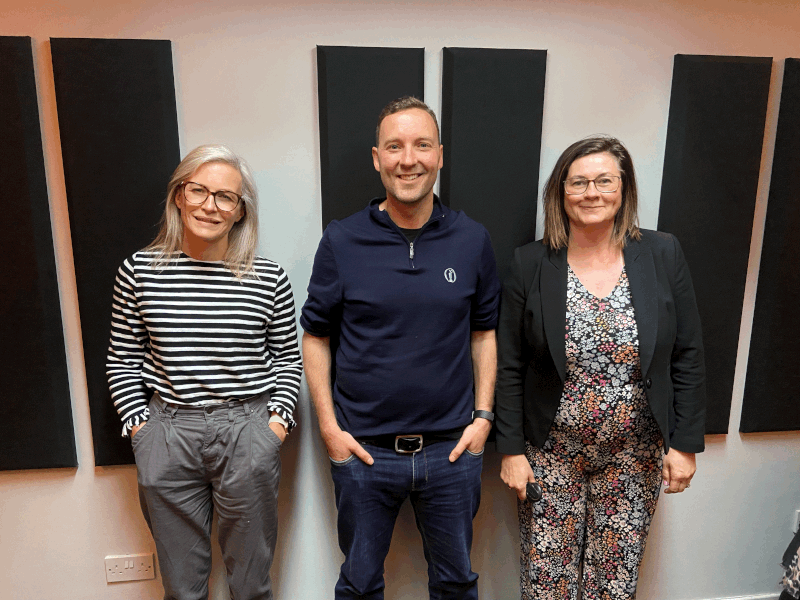
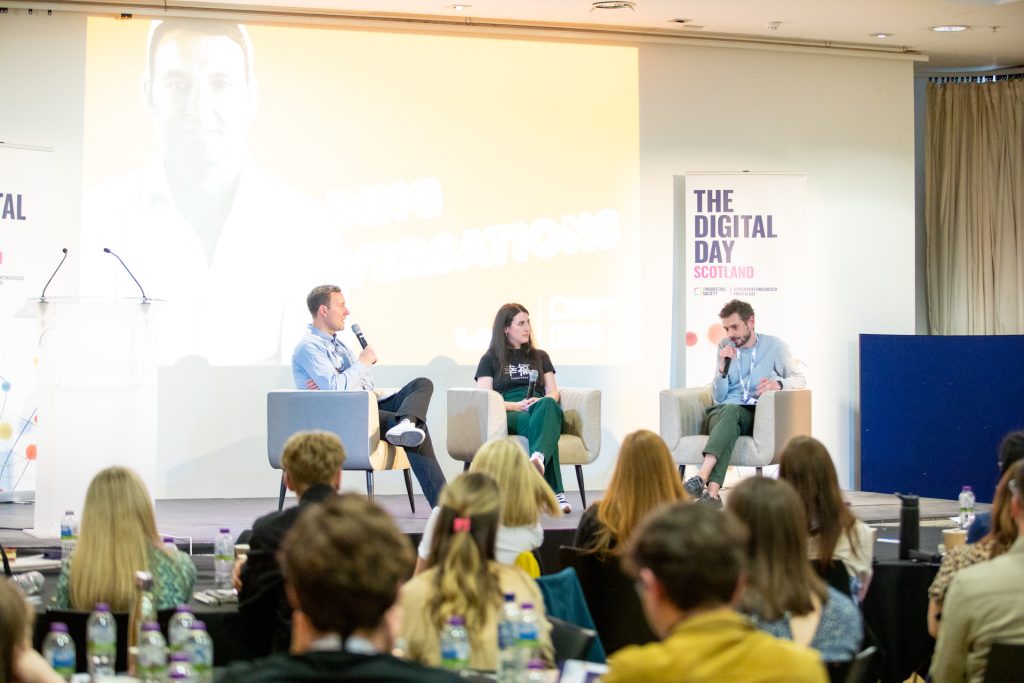
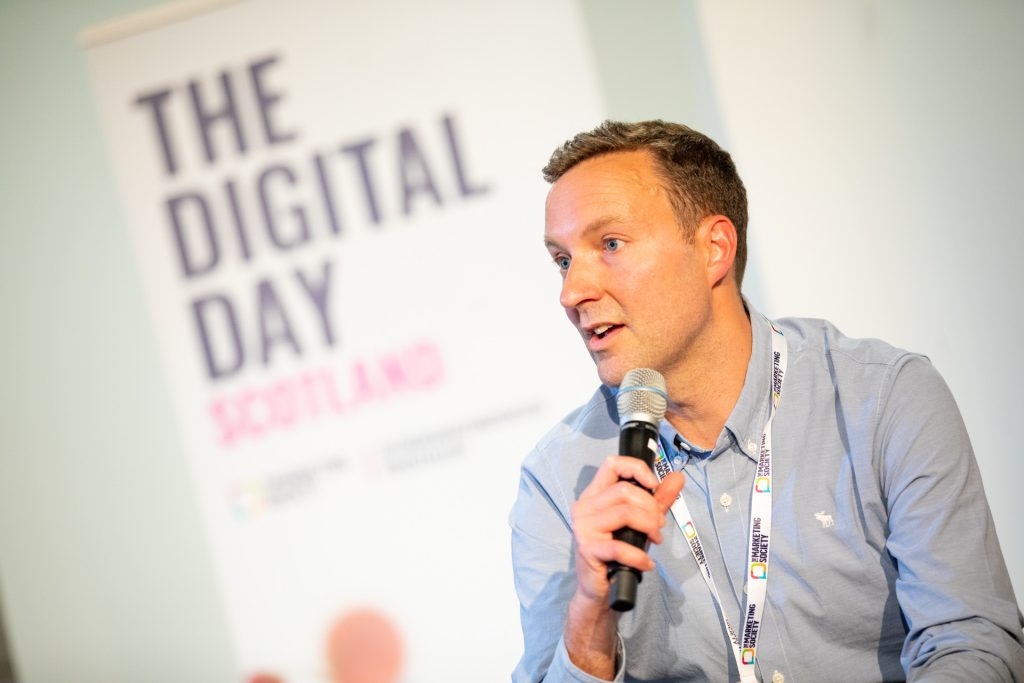
Contact Us
Give us a call, or complete the form. We’ll put the kettle on and by the time you get here we’ll already be thinking about your business.
+44 (0)131 551 7777
create@thelaneagency.com
media@thelaneagency.com